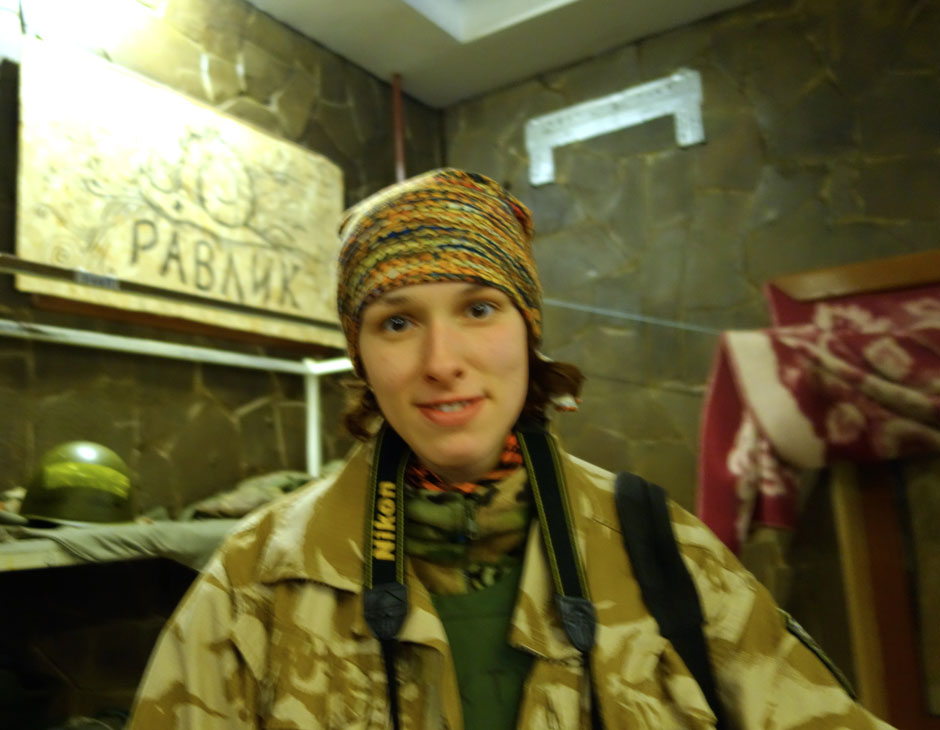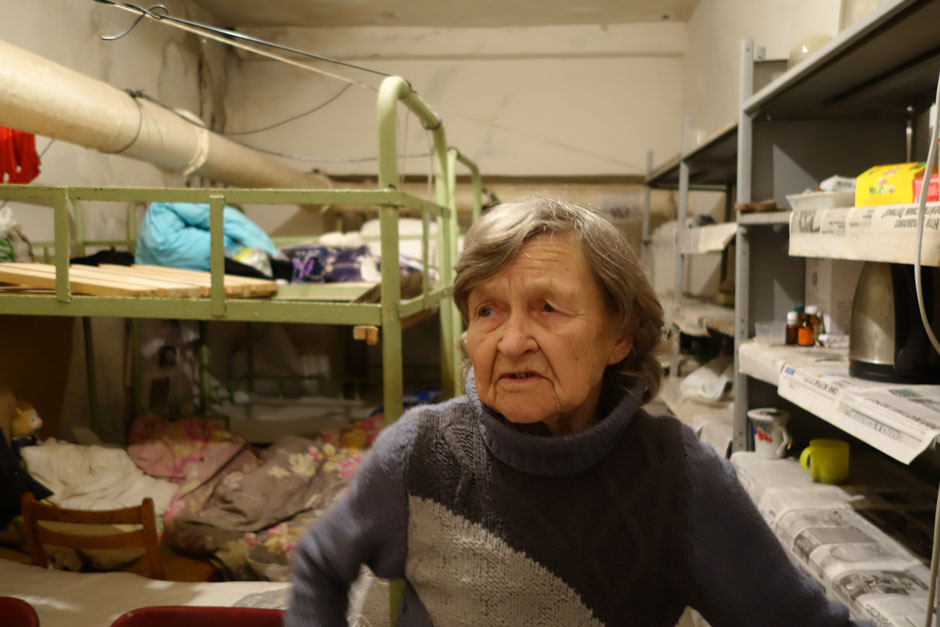Some Ukrainians have been angry about my recent report in this space, especially about the title, “Ukraine: Divided and Bitter.” It is wrong to say that Ukrainians are divided, someone curtly retorted on Twitter, because in fact they have never been as united as they are now. In general terms, most Ukrainians are more united than ever and many say that Vladimir Putin and the war have done more to strengthen Ukrainian patriotism than anything since independence in 1991. But it is impossible to ignore that the conflict is by now not only a matter of aggression by Russia but also a civil war in the east. It is no good citing old opinion polls of what Ukrainians thought before the war and assuming that their views haven’t changed.
Take the poets Olena and Anna. Before Ukraine’s recent upheavals, Olena Maksymenko, a tall twenty-nine-year-old from Kiev, loved to write and visit other countries. “I traveled a lot, in the Caucasus, Georgia, Mongolia, Baikal. I was also interested in ancient history, archaeology and mythology.” Not many Ukrainians are travel journalists and poets, but Olena was carving out a nice career and name for herself as both.
But something changed for Olena with the Maidan revolution, which began in November 2013. Like so many other middle-class and educated Ukrainians, all she wanted was for Ukraine to be a normal European country. Since 1991, it had continued to linger in the twilight zone between Russia and the rest of Europe, all the while crushed under a culture of economic and political corruption that had impoverished a country that should be rich. So when president Viktor Yanukovych refused to sign long-negotiated agreements with the EU, Olena joined the protests. Her poems became political and she read them from the stage on the Maidan in Kiev.
Then, in March, 2014, soon after the fall of Yanukovych, she went to Crimea, which one week later would hold a referendum on joining Russia. Close to the border between Crimea and the mainland of Ukraine she was detained by men she described as “just guys with guns.” They were, she said, Cossacks, Berkut (the name of the former Ukrainian riot police, many of whom had been called up from regions loyal to Yanukovych to try to control the protesters at the Maidan), and Russian soldiers. They threatened to kill her. They pointed a gun at her and pulled the trigger, though it was not loaded, hit her, and chopped some of her hair off. “They said I was an agent of the USA and they tried to get information from me about other journalists. Three days later, I was released,” she told me.
When she came back from Crimea she discovered that one of her best friends, also closely involved in the Maidan, had committed suicide. By chance this moment in her life coincided with a writers’ residency she had won, organized before the revolution, in Latvia. While she was there, a whole novel about her friend and about the Maidan events just poured out. Then she trained to use a gun and fight but discovered that only women with the right connections were being allowed to go into combat on the Ukrainian side. “If there is a choice between a woman who has military training and a man who doesn’t they will choose the man,” she said. Women like her, she complained, were being shunted into cooking or paper-shuffling jobs. This made her an angry woman, she told me.
We travelled together to the Pervomais’ke, a small government-held town cum suburb of Donetsk, close to its airport. (This is not the same place as the rebel-held Pervomaysk I described in my last piece here.) She was attached to a group of volunteer medics who have set up a first aid center for Ukrainian soldiers injured on the front in a former hotel. Standing behind the hotel reception desk was Oleksiy Reznikov, aged twenty-two, who had a shelf of small bottles of different colored inks behind him and above his Kalashnikov. He was the frontline tattooist. “This is a war we need to fight and everyone needs to find their niche,” he told me. Soldiers and medics were having him tattoo them with their blood groups and nicknames, and some with patriotic Ukrainian themes and symbols. “It raises morale,” he said.
We could hear fighting, but for the time being hostilities have significantly tapered off as a result of the February 15 ceasefire. Bored, Olena was filing stories and collecting more that might appear in another novel. From her childhood she told me she had thought that it would be amazing to be a war correspondent and go cover conflicts in other countries. “But unfortunately the war came to me.”
Advertisement
A few days later, in Donetsk, I met Anna Iureva, another poet, aged eighty-seven, whose now abandoned house was only a few minutes walk from the hotel-cum-field hospital in Pervomais’ke. Donetsk is the capital of the self-proclaimed Donetsk People’s Republic, and together with neighboring Lugansk, makes up the would-be state of Novorossiya, or “New Russia.” Without support from Russia, which many people here look to as a savior, the region would almost certainly be retaken by Ukrainian forces.
Anna is a tiny, sprightly grey-haired lady. She told me that as a schoolgirl she had written poems, but that because she had been the youngest of eleven, her parents could not afford to give her much of an education. For the last eight months she and her family have lived in a dingy nuclear bomb shelter. Since the ceasefire, most of the people who stayed here have gone home but some, like Anna and her family, have not.
Now, bored, and unable to sleep at night, she has begun to write again. A poem called “Fighters” begins:
You are fighters of our country
Our husbands, brothers and sons
Liberators of our country
You are going to fight, not for the sake of honor
But for the State of Novorossiya
Then the poem refers to Petro Poroshenko, Ukraine’s president:
Poroshenko decided to give mines, factories and land to the West and then flee abroad
And they destroyed so many towns thinking they were winning
But now they are wiping away tears and snot
They are wondering where to flee, and how to cover their bloody tracks
And finally:
You have to pay with your own life for everything that was destroyed
Oh God, bless the fighters going into battle
Save them from any evil
And bring them home alive
Anna said she would like to go home but “fighting is constant there,” and anyway, she did not want to return while Pervomais’ke was still under Ukrainian control. “They did a lot of harm to us,” she said. “How many people have they killed? How many homes have they destroyed?” Then she took me into a side room where her family and others slept in cramped bunk beds. It was incredibly hot; her forty-three year-old granddaughter, who has Down’s syndrome, was sitting right in front of a fan heater. Anna showed me a tin, with oil and wick, which they used for light when the electricity went off, because they had run out candles. She said it gave off a horrible, choking smoke.
For now, Ukraine’s forces are not strong enough to retake what they call the “occupied territories.” And the rebels, even with Russian support, are not strong enough to take more territory from the government they refer to as the “fascist junta.” Before the war there was no oppression of Russians and Russian-speakers here, as is often claimed now, not least because President Yanukovych, who came from here, and his Donetsk clan actually dominated the whole country. Ethnic Russians and Ukrainians coexisted peacefully and for many here the distinction was fluid anyway.
But since the war began, hundreds of thousands have fled from the region under rebel control. Middle-class people, tending to be more pro-Ukrainian, have moved west into Ukrainian-controlled territory while others, especially those with family and connections in Russia, have gone there. Among those who remain are many proud of their working-class and Soviet heritage who see Russia as their motherland. Many older people, less willing or able to flee, are increasingly embittered by their fate and blame the Ukrainian government for making it hard even to access their meager pensions.
Like it or not, the fighting of the past year has changed the people of eastern Ukraine. The Donetsk and Lugansk People’s Republics are emerging as real political entities just like others in post-Soviet breakaway regions, and Serb areas in the former Yugoslavia did. In Croatia a Serbian would-be breakaway state was swept away by war, and most of its people fled, but in Bosnia, a Serbian entity exists today as a semi-independent, quasi-state. People live side by side in Bosnia, but don’t have much to do with one another. This, quite possibly, could be the fate of Ukraine and its east, but Anna says that if her home remains under Ukrainian control then eventually, “in the worst case,” she and her family will see if they can make a new home somewhere in Russia.
In Kiev, a senior security official told me that even though Ukraine had of course become an independent state when the Soviet Union had collapsed, this was not something that Ukrainians had fought for. Now, he said, they were fighting “a classical war” of independence. “We have to force, or persuade the Russians to consider us a separate people, entity and state.” He added, “but wars of independence have a second step and that is a war for borders.”
Advertisement
Anna and Olena—one an eighty-seven year old bomb shelter poet, the other a poet determined to put down her pen and get a gun—may not be typical. But with the changed social structure of the rebel-held territories and the flight of middle-class and younger people, it is not just the supporters of Ukraine who think they are fighting a war of independence. Both sides do—and both are fighting for their borders.




